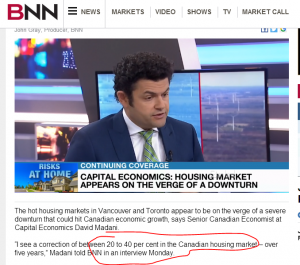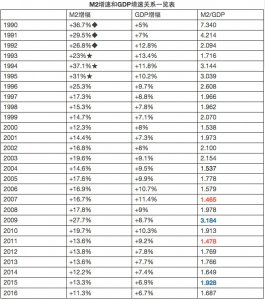- 最大赞力
- 0.00
- 当前赞力
- 100.00%
新闻:《加拿大房价5年内跌40% 专家劝年轻人:别买房》的相关评论
我来记住这个砖家,如果到2022年房价没跌 40%, 就是说2022年底, 大多区均价是2017年均价85万的 跌幅40% = 51万 的话。 我要打电话给他,羞死他, 让他辞职!总部设在英国伦敦的咨询公司Capital Economics拥有60名经济学家,其专长是经济分析、预测及咨询。该公司多伦多办公室的加拿大经济学家马达尼(David Madani)今天对加拿大财经电视台BNN(Business News Network)表示,多伦多和温哥华房屋市场正处于“严重衰退”的边缘,房市的陷落不仅会损害到加拿大的GDP,而且全国房价也将持续下滑,下降幅度最高或达40%。
马达尼说,加拿大的房屋市场正日渐低迷,将对今年第二季度及以后的经济增长产生负面影响。他警告说,温哥华房屋销量上升是一个虚假信息,而多伦多目前交易量大跌已经表明,GTA地区的房价在今年年底之前将略微下降,但随后5年将持续下降,价格调整幅度在20-40%之间。
马达尼指出,别被温哥华最近的数据所迷惑:根据大温地产局的资料,今年5月房屋销量比4月增加22.8%,但仍然比去年5月创纪录的销量低8.5%。虽然今年5月新的房屋上市量比去年同期减少3.9%,但比今年4月增加了23.2%。
他说这个短期的销量增加实际上是因为更低的按揭利率在起作用,但这个效应已经开始减退。由于温哥华房价被大大高估,加之联邦按揭保险的新规已经开始全面发挥作用,因此销量增加可能是暂时性的。
再看GTA地区,多伦多房产局最新的数据已经显示房屋交易量大跌,今年5月份各类房屋销量比一年前跌20.3%,独立屋销量跌26.3%,condo销量也跌了6.4%。
马达尼认为,除了联邦按揭保险新规的影响之外,安省省府征收海外买家税及加强租金监管的系列新政显然发挥了作用,这些因素综合作用的结果,GTA的房市开始由热变冷。
考虑到多伦多地区占了全国房屋市场的20%,其房屋销量大减会直接影响到今年第二季度的经济增长,令GDP增长率缩减0.5个百分点。如果把温哥华的情况也考虑在内,那么对加拿大经济前景不是一个好兆头。
马达尼认为,GTA地区房屋交易量与新的物业上市量比率开始下降,这已经说明随后而来的将是房价下滑。不过,尽管房价下降势不可免,马达尼在今天的建议中说,他反对年轻人把钱投资到房地产,因为他估计房价开始下滑之时,也可能是股票上扬之日。他说自己的专业就是房地产,但他宁愿租房不买房,称自己是一名快乐的租客("I'm a happy renter”)。
他说租房不仅更便宜,而且可以多储蓄,也可以把钱拿来投资。





